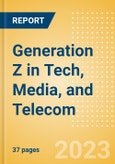Major global industries-such as consumer electronics, retail, social media, entertainment, personal healthcare, travel, finance, and advertising-have already been radically disrupted and reshaped by Gen Z.
Key Highlights
Asia has the largest Gen Z population at 1.2 billion, followed by the Middle East and Africa with 470 million. However, the Middle East and Africa region has the highest share of Gen-Zers out of its total population at 34%. According to the World Economic Forum (WEF), Generation Z will account for over 27% of the global workforce by 2025.At the same time, the cohort is gaining financial power. History's biggest-ever transfer of wealth and power is underway as so-called boomers retire and die and younger generations take over. The publisher predicts that up to $8.6 trillion in assets will be transferred to younger generations within the next 10 years.
Like previous generations, the emerging Gen Z cohort has unique habits, economic activities, and social behaviors. Gen-Zers emphasize a work-life balance, diversity, inclusion, and personal growth. They both inform online trends and are greatly influenced by them.
Scope
- The report looks at the impact of Generation Z on the tech, media, and telecom sector.
- It includes a demongraphic briefing, which identifies the key characteristics of the different cohorts alive today and analyzes the influence of Gen Z in China, the US, and India.
- It identifies the key trends relating to Generation Z, including environmental, social, and governance (ESG) factors, social media and influencer culture, social activism, and generative AI.
- The report looks at Gen Z's impact on the TMT sector in three specific areas: workplace technology, home technology, and entertainment technology.
Reasons to Buy
- Gen Z is increasingly important in many nations as its numbers and influence grow. A key factor in the importance of Gen Z is its growing financial power. History's biggest-ever transfer of wealth and power is underway as the so-called ‘boomers' retire and die, and the younger cohorts take over with very different experiences, assumptions, habits, and values. The publisher predicts that up to $8.6 trillion in assets will be transferred to younger generations within the next 10 years. This report looks in detail at the key attributes of Gen Z and how it impacts businesses-both employees and consumers-in the tech, media, and telecom (TMT) sector.
Table of Contents
- Executive Summary
- Players
- Demographic Briefing
- Trends
- Business Impact
- Glossary
- Further Reading
- Thematic Research Methodology
Companies Mentioned (Partial List)
A selection of companies mentioned in this report includes, but is not limited to:
- Alibaba
- Alphabet
- Amazon
- Baidu
- ByteDance
- Cisco
- Disney
- Epic Games
- Generac
- Microsoft
- Netgear
- Oracle
- Philips
- Salesforce
- SAP
- Sense
- Tencent
- Unity
- Zoom








